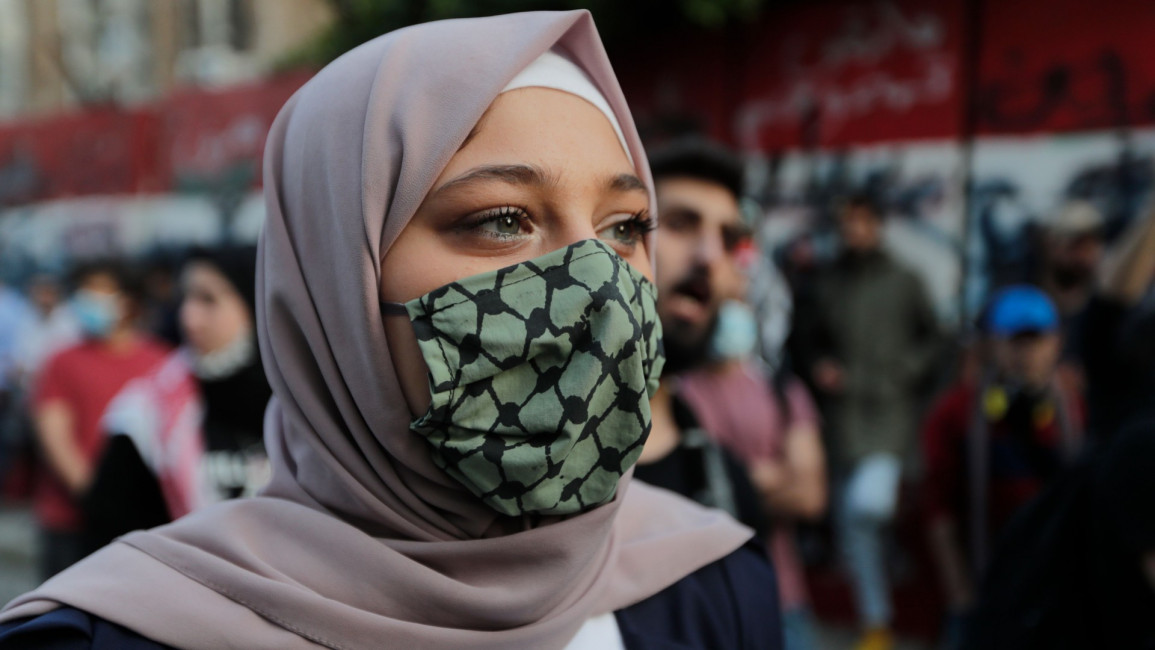Lebanon's demonstrators defy coronavirus lockdown to protest on Labour Day
Protestors took to the streets on Friday in different areas of the country, the Lebanese Daily Star newspaper reported.
Reports on social media showed demonstrators heading to downtown Beirut, the focal point of Lebanon's ongoing protests which began in October, to protest the economic situation in the country.
Photos published on social media from Kafr Roummane, a city in southern Lebanon, also showed protestors out on the streets for Labour Day.
In the central city of Aley, the leftist movement Li Haqqi led protests.
The annual Labour Day often sees protests around the world but this year's are expected to be calmer given the ongoing global health crisis.
Friday's protests in Lebanon began peacefully, the Daily Star reported, in contrast to recent daily clashes that have taken place between protesters and the army across the country.
Read more: Lebanese army kills protester in Tripoli amid deteriorating economic situation
Meanwhile, the Lebanese government on Thursday approved a long-awaited plan to rescue the debt-saddled economy from its worst crisis in decades.
A lockdown to fight the coronavirus pandemic has added to the economic woes besetting the country, which include soaring inflation, a liquidity crunch and a plummeting currency.
|
Demonstrators in northern Lebanon have attacked banks and clashed with security forces for three consecutive nights, re-energising a protest movement launched in October against a political class that activists deem inept and corrupt.
The government unanimously approved the economic plan after minor amendments, the presidency said on Twitter following a cabinet meeting in the presidential palace in Baabda.
Leaks on the economic plan to Lebanese media suggest the country needs $80 billion in funds to exit the crisis, including $10 to $15 billion in external financing in the next five years.
Planned reforms reportedly include cuts to state spending and a restructuring of the public debt, one of the highest in the world at 170 percent of gross domestic product (GDP).
International donors have said that such reforms are necessary for Lebanon to unlock financial assistance, including $11 billion in grants and loans pledged during a 2018 conference in Paris.
Financial collapse
Lebanon is grappling with its worst economic turmoil since the 1975-1990 civil war, compounded by measures to tackle a novel coronavirus outbreak that has infected 721 people and killed 24.
The Mediterranean nation has been rocked by a series of political crises in recent years.
An economic crunch helped set off unprecedented cross-sectarian mass protests in October and unseated the last government.
The demonstrations had largely petered out after a new cabinet was tasked earlier this year with implementing urgent reforms to unlock billions in international aid.
But protesters have hit the streets again in recent days in defiance of the lockdown, railing against the slump in the pound and rocketing inflation.
Prices have risen by 55 percent, while 45 percent of the population now lives below the poverty line, according to official estimates.
Read more: Corruption, not coronavirus, is ravaging Lebanon
The government has yet to request financial assistance from the International Monetary Fund, which has so far only provided technical assistance.
Experts have lobbied in favour of an IMF bailout which they say is the country's only escape route from its current slump, but some officials remain wary of the world body.
The government in March defaulted on its sovereign debt for the first time because of dwindling foreign currency reserves.
Follow us on Facebook, Twitter and Instagram to stay connected



